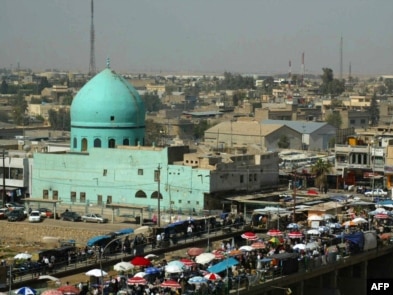 Joseph Sywenkyj for The New York Times
Joseph Sywenkyj for The New York Times
Last week, a Kurdistan Democratic Party building in Sulaimaniya, Iraq, displayed a poster of Massoud Barzani in his youth, right.
By SAM DAGHER
Published: July 28, 2009
ERBIL, Iraq – The president of the semiautonomous Kurdistan region, Massoud Barzani, on Tuesday rejected proposals by the United Nations to resolve Iraq’s explosive internal border disputes, and reiterated his determination to proceed with a contentious local constitution.
 Khalid Mohammed/Associated Press
Khalid Mohammed/Associated Press
In Erbil, Iraq, supporters of Massoud Barzani, the Kurdish regional leader, on Sunday celebrated a projected election victory.
Mr. Barzani, newly empowered after winning an estimated 70 percent of the vote in the region’s presidential and parliamentary elections on Saturday, made the remarks in his first interview with the news media since the vote.
“Regrettably, the recommendations of the United Nations are unrealistic,” Mr. Barzani said, referring to a report by the United Nations in April outlining options for the settlement of territorial disputes that threaten Iraq’s fragile stability. They included making Kirkuk Province – including the oil-rich city of Kirkuk that is claimed by Kurds, Sunni Arabs and Turkmens – into an autonomous region.
American officials have repeatedly stated their support for a United Nations-brokered solution.
“We will not accept that the United Nations or anyone else present us with alternatives to Article 140,” he added, referring to the clause in Iraq’s national Constitution that calls for a census followed by a referendum to settle the fate of areas including Kirkuk.
Tensions have been aggravated by the presence of Kurdish troops in parts of the contested areas. The situation worsened in June when the region’s Parliament, overwhelmingly controlled by the two governing parties, including Mr. Barzani’s party, the Kurdistan Democratic Party, approved a draft constitution that enshrined Kurdish rights to the disputed territories.
Although the document states that the final demarcation of the region’s boundaries is subject to Article 140, it is unequivocal in its assertion that the disputed territories are inseparable from the “geographic and historic entity” called Iraq’s Kurdistan region.
Mr. Barzani said one reason he agreed to put off a referendum on the regional Constitution that was to have been held during Saturday’s elections was a request this month from Vice President Joseph R. Biden Jr. and other American officials.
“They asked if it was possible to postpone it because the timing was inappropriate,” he said.
Mr. Barzani said he was determined to put the constitution to a referendum this fall. Such a move would place him on a collision course not only with the central government, which opposes the document in its current form, but also with a new Kurdish political coalition that did surprisingly well on Saturday.
Shaho Saeed, a top official in the coalition, Gorran, said his movement filed a complaint this month with Iraq’s federal court in Baghdad that questioned the legitimacy of the process that the previous regional Parliament adopted to approve the constitution.
Mr. Saeed said Gorran opposed the document because it gave powers to Mr. Barzani “that exceed the powers of Parliament and the judiciary.” Gorran wants the proposed constitution redrafted, he said.
Although the region’s two governing parties, including the Patriotic Union of Kurdistan, retain a comfortable majority to form the next government, Gorran appeared to have clinched at least 25 of the new Parliament’s 111 seats, according to preliminary results.
With the two parties expected to remain firmly in control of Parliament, Mr. Barzani said that no one has the two-thirds majority needed to redraft the document.
“The new Parliament has no right to redraft the constitution,” he said. “It is over.”
Mr. Barzani said he welcomed the emergence of an opposition movement like Gorran, but issued a warning to those who might interpret it as a loosening of the grip of the two parties that control the region’s security forces, economy and patronage network.
“If any regional country or even Baghdad interferes in an internal matter, or any individual inside the region conspires against the region’s security and well-being,” he said, “actions will be taken in accordance with the law against those who want to undermine the unity of the Kurdish house.”








